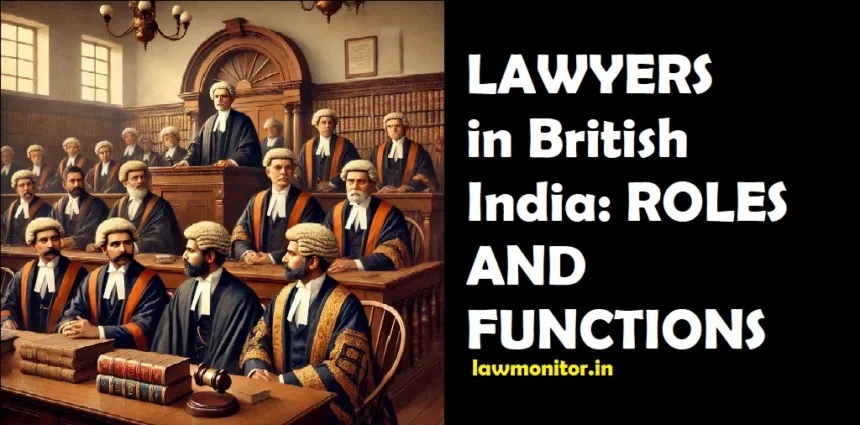During British rule, legal practitioners in India were classified into different categories based on their roles and qualifications. The following chart illustrates the different classes:

Attorneys
Attorneys previously only referred to British attorneys or solicitors but now this definition is sometimes used to refer to advocates.
Solicitors:
Prior to the enactment of the Advocates Act, solicitors referred to British solicitors who were permitted to practise in the High Courts in pre-Independence India. Today, in the Bombay and Calcutta High Courts there is a separate class of legal practitioners, known as solicitors, who prepare the case, but do not argue in court.
Barristers:
Barristers of England had come to occupy a predominant position in the legal profession in the British India. On the Original Side of the Calcutta High Court, only Barristers could practice even though the distinction between Barristers and Vakils had been removed by other High Courts.
Pleaders:
Law graduates who did not possess the additional qualification for enrolment as vakil of the
High Court and non-law graduates who could pass the pleadership examination held by the High Court were given certificates enabling them to act and plead as pleaders in the district and subordinate Courts. The pleaders had entry into the High Court only after gaining an experience of a certain number of years as pleaders. There were different grades of pleaders as well. This class of practitioners also does not exist today in Indian courts.
Vakil:
Vakils were native practitioners who were qualified to appear and practise in the High Courts
of pre- Independence India. The Legal Practitioners Act had laid down additional requirements for a law graduate to be eligible to qualify as a vakil. This class of practitioners does not exist now.
Mukhtars:
Mukhtars were another class of practitioners in the subordinate courts. They were persons who had after passing the Entrance Examination corresponding to the Matriculation Examination of the later times passed the Mukhtarship Examination held by the High Court. Although their sanads or licences permitted them to practice in all subordinate courts, they were by reason of the High Court Rules and Orders, mainly confined to acting and pleading in the criminal courts in the mofussil. These mukhtars were not permitted to plead in any subordinate civil court.
Revenue Agents:
Revenue Agents were certificated and enrolled under rules made by the Chief Controlling Revenue Authority under section 17 of the Legal Practitioners Act, 1879. Their practise was confined to revenue offices mentioned in their certificates and other offices subordinate to them.
Advocates:
Prior to the enactment of the Advocates Act, the term “advocates” referred only to English and Irish barristers and members of the Faculty of Advocates in Scotland. This class was permitted to practise in the Supreme Court of Judicature in Bengal, to the exclusion of native practitioners. However, today this term is used to refer to lawyers qualified to practise in the Courts of India. An advocate is a person authorized to appear in a legal matter on behalf of a party. An Advocate possesses a law degree and is enrolled with a Bar Council, as prescribed by the Advocates Act, 1961. Advocates are the only class of persons legally entitled to practice law or to provide legal advice. After being authorized to appear in a case by a client who has signed a vakalat, advocates prepare cases and argue them in Court. When appearing in a courtroom, an advocate usually dresses in black and white, and wears a band and gown.
Advocates must register with a State Bar Council to practice law. Some experienced lawyers with special expertise are given the title of Senior Advocate by the Supreme Court or a High Court.
Senior Advocates
- They cannot file a vakalatnama (power of attorney) or appear in court without another advocate.
- They do not directly take cases or draft legal documents.
- They argue cases in court but only when instructed by another advocate.
- They wear special gowns with flaps on the shoulders.
Advocate on Record (AOR)
An AOR is a lawyer who has passed a special Supreme Court exam after at least five years of practice and one year of training with an experienced AOR.
- Only an AOR can file petitions, affidavits, or other applications in the Supreme Court.
- The AOR handles all legal procedures and is responsible for the case.
- The cause list (court schedule) carries the AOR’s name.
- All notices from the Supreme Court are sent to the AOR, not the client.
- AORs can argue cases but mostly work like solicitors (legal advisors).
Legal Advisors to the Government
- The Attorney General of India, Solicitor General, and Additional Solicitor General advise the Central Government.
- Advocate Generals perform a similar role for State Governments.
- The Attorney General of India and Advocate Generals are Constitutional posts, with qualifications set by the Indian Constitution.



